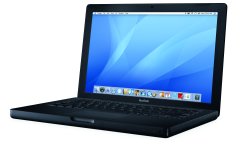Core 2 Duo MacBooks: The Importance of Good Components 17 years, 5 months ago by Martey Dodoo

I have been semi-seriously considering buying one of the new MacBooks with Intel Core 2 Duo processors (I am partially serious because I would like a computer with a Core 2 Duo processor and a SATA hard drive; the seriousness is only partial because it would be hell to get everything properly working in Linux). If I got one, I would be the black MacBook, despite the fact that it costs more than it should. In a marketing scheme dubbed the black tax, a black MacBook will set you back $50 more than a similarly configured white MacBook (with the original MacBooks, the difference was $100). Alas, having run across a number of ancient iBooks whose cases are now a dirty brownish-grey, I refuse to buy a white notebook.
But while MacWorld found that Core 2 Duo processors made the MacBook substantially cooler, it also discovered while benchmarking that the black Core 2 Duo MacBook is actually slower in some tasks than white MacBooks:
One question remains from these results: With the two 2GHz MacBooks sharing so many specifications, why are their test numbers so different? The two systems were neck and neck in the vast majority of our tests, but just like the last time we tested MacBooks, we found that subtle hard-drive differences can affect the final numbers. The white 2GHz MacBook uses a 80GB Fujitsu drive while the black MacBook uses a 120GB Toshiba model. And while both spin at 5,400 rpm, we found the white's Fujitsu drive helped that system turn in 5.5-percent faster Zip Archive results and 10-percent faster results in the iPhoto file import test.
While the black tax is ridiculous enough, the idea that upgrading your hard drive will actually make your computer slower is absurd. Although the SATA hard drives in MacBooks are much easier to upgrade on your own than those in iBooks, the entire problem could be avoided if Apple simply used a better 120 GB hard drive to begin with.